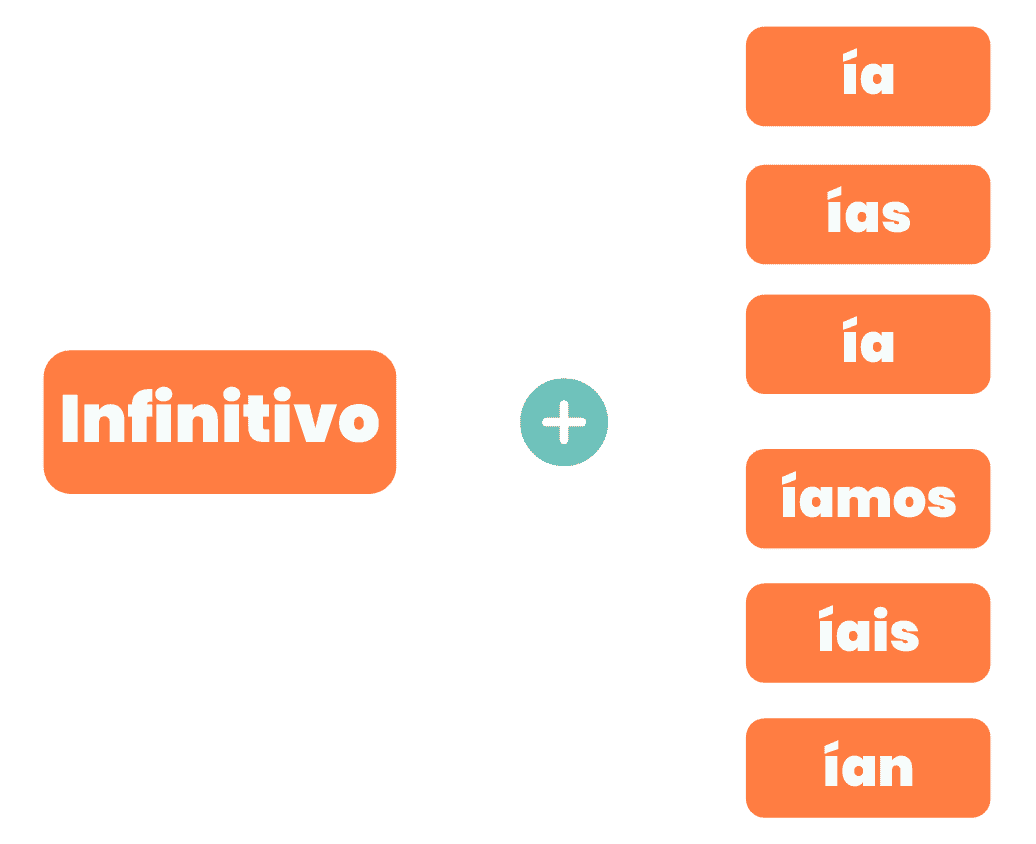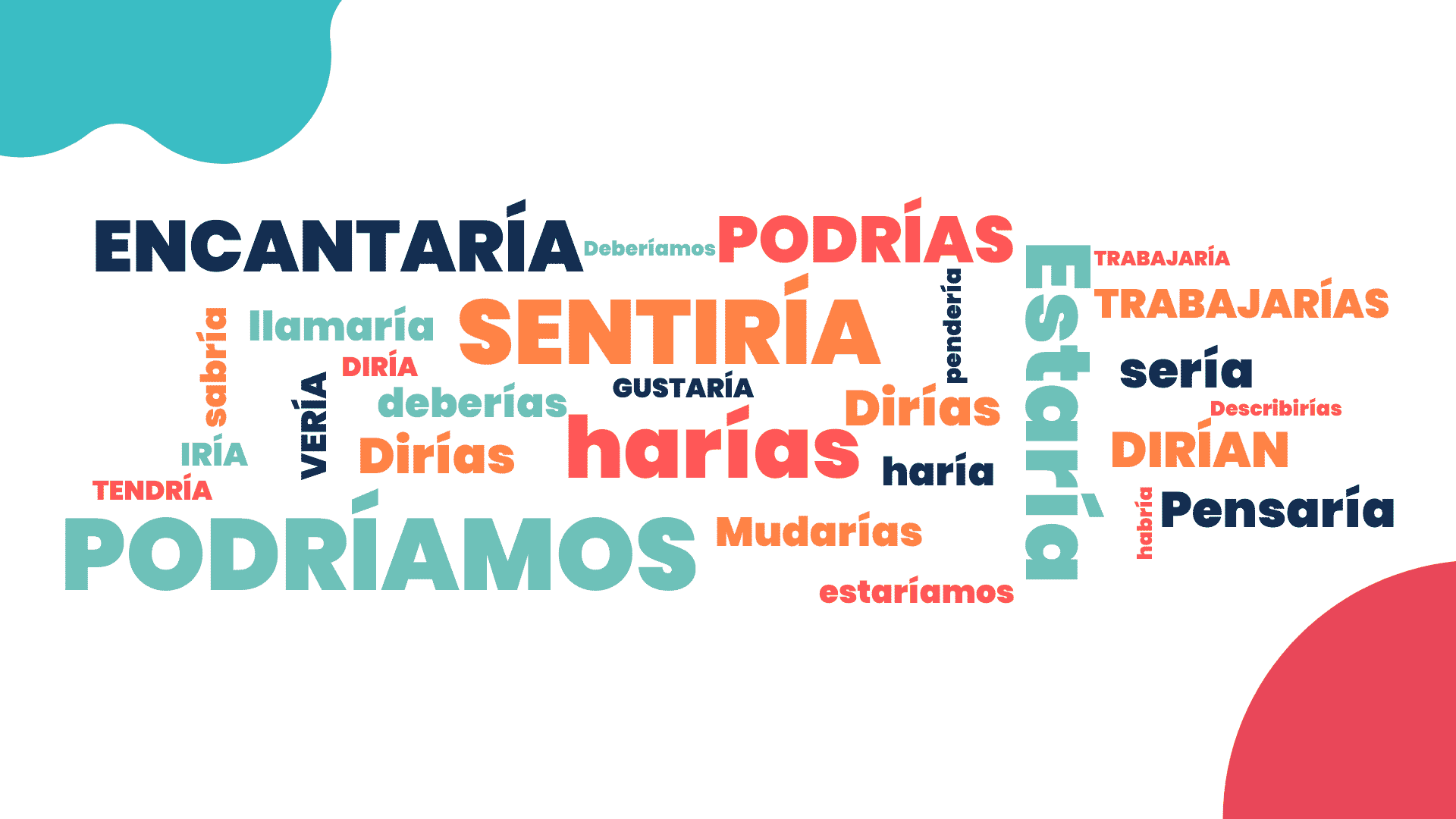
Conditional Tense: Spanish Grammar Made Easy
DATE:
Hey there, Spanish learners! Ready to dive into the exciting world of verb tenses? Today, we’re exploring the conditional tense, a must-know for anyone looking to master Spanish. Imagine expressing hypotheticals, making polite requests, or sharing your wildest dreams in another language! The conditional tense opens up a whole new way to communicate. This guide breaks down the essentials, making it super easy to understand and use the conditional tense like a pro. Let’s get started and unlock the potential of your Spanish skills together!
What is the Conditional Tense in Spanish?
The conditional tense in Spanish is a verb form used to express hypothetical situations, polite requests, or actions that would happen under certain conditions. Think of it as the “would” tense in English. For example, “I would go” translates to “Yo iría.” It’s like having a crystal ball, allowing you to talk about what could happen, what you wish would happen, or what you would do if things were different.
How to Form the Conditional Tense in Spanish
Conditional Tense with Regular Verbs in Spanish
In Spanish, forming the conditional tense is straightforward. For regular verbs, simply add the conditional endings (-ía, -ías, -ía, -íamos, -íais, -ían) to the infinitive form of the verb. So, “hablar” (to speak) becomes “hablaría” (I would speak). The Conditional Tense in Spanish has the same future tense root.

Look at the examples of regular verbs in the Spanish conditional tense in the table below and notice that in English we have only one conjugation for the verb conditional.
|
Pronouns |
Hablar (speak) |
Comer (eat) |
Abrir (open) |
|---|---|---|---|
|
Yo |
hablar ía |
comer ía |
abrir ía |
|
Tú |
hablar ías |
comer ías |
abrir ías |
|
Él/Ella/Usted |
habla ría |
comer ía |
abrir ía |
|
Nosotros |
hablar íamos |
comer íamos |
abrir íamos |
|
Ustedes |
hablar ían |
comer ían |
abrir ían |
|
Vosotros |
hablaríais |
comer íais |
abrir íais |
|
Ellos/Ellas |
hablarían |
comer ían |
abrir ían |
Remember that vosotros is used in Spain and ustedes in Latin America.
Some other examples:
- ¿Qué ejemplo me darías? – What example would you give me?
- El niño dijo que comería temprano. – The kid said he would eat early.
- Compraría ese vestido rojo, ¡es perfecto! – I would buy that red dress, it’s perfect!
- ¿Te gustaría venir a las 8 pm? – Would you like to come at 8 pm?
- ¡Me encantaría conocerte! – I would love to meet you!
Conditional Tense In Spanish Using Irregular Verbs
There are only 12 irregular verbs for the conditional tense in Spanish. The same verbs that are used for conditional tense are also used for simple future tense. The endings have the same form and their use doesn’t change.
Remember the form of the infinitive like they are shown next.
Verb forms with “d” in the root
Such as salir, poner, tener, venir, valer.
|
Pronouns |
Salir |
Poner |
Tener |
Venir |
Valer |
|---|---|---|---|---|---|
|
Yo |
saldr ía |
pondr ía |
tendr ía |
vendr ía |
valdr ía |
|
Tú |
saldr ías |
pondr ías |
tendr ías |
vendr ías |
valdr ías |
|
Él/Ella/ Usted |
saldr ía |
pond ría |
tendr ía |
vendr ía |
valdr ía |
|
Nosotros |
saldr íamos |
pondr íamos |
tendr íamos |
vendr íamos |
vendr íamos |
|
Vosotros |
saldr íais |
pondr íais |
tendr íais |
vendr íais |
valdr íais |
|
Ellos/Ellas/ Ustedes |
saldr ían |
pondr ían |
tendr ían |
vendr ían |
valdr ían |
Examples:
- Yo saldría contigo todos los días: I would go out with you every day.
- Tú tendrías que salir usando tu carro: You’d have to go out by using your car.
- Ella pondría ejemplos perfectos del futuro: She would go set perfect examples about the future.
- Nosotros vendríamos todo el tiempo: We would come all the time.
- Ellos valdrían mucho por su condición: They would be worth it a lot because of their condition.

Verbs that lose one vowel
Such as Caber, Haber, Poder, Saber.
|
Pronouns |
Caber (To fit) |
Haber (To have) Spanish auxiliary verb |
Poder |
Saber |
|---|---|---|---|---|
|
Yo |
cabr ía |
habr ía |
podr ía |
sabr ía |
|
Tú |
cabr ías |
habr ías |
podr ías |
sabr ías |
|
Él/Ella/Usted |
cabr ía |
habr ía |
podr ía |
sabr ía |
|
Nosotros |
cabr íamos |
habr íamos |
podr íamos |
sabr íamos |
|
Vosotros |
cabr íais |
habr íais |
podr íais |
sabr íais |
|
Ellos/Ellas/ Ustedes |
cabr ían |
habr ían |
podr ían |
sabr ían |
Examples:
- Yo podría comer con él todo el día: I could eat with him all day.
- Tú cabrías pero estás tenso. – You would fit but you’re tense.
- Él sabría qué hacer. – He would know what to do.
- Nosotros habríamos sido como tú. – We could have been like you.
- Ella querría otro helado, por favor. – She would like another ice cream, please.
3. Conditional Tense in Spanish with Reflexive Verbs
The conditional is used with reflexive verbs as well, to express actions performed on the same subject/object. Just as any other verb, form the conditional tense with the infinitive and the endings.
The only extra word, in this case, would be the reflexive pronoun (me, te ,se , nos ,os, se). They always go before the verb.
Example:
- Yo me mudaría a una casa más grande. – I would move to a bigger house.
- Me comería la torta entera si fuera hecha de chocolate. – I would eat the whole cake if it were made of chocolate.
- Él se expresaría mejor sobre su condición con un ejemplo. – He would express in a better way about his condition with an example.
- Nosotros nos escaparíamos usando un artefacto que venga del futuro. – We would escape by using a device coming from the future.
- Vosotros os marcharíais como si nada pasó. – You would leave as if nothing happened.
- Ellos se convertirían en ejemplos perfectos de la condición humana. – They would become perfect examples of the human condition.
4. Verbs in the conditional tense with an irregular root
Something else to take into account is the change in the infinitive for this form.
|
Pronoun |
Decir (to say / to tell): dir |
Hacer (do-make): har |
|---|---|---|
|
Yo |
dir ía |
har ía |
|
Tú |
dir ías you would say/tell |
har ías you would do/make |
|
Él/Ella/Usted |
dir ía he/she would say/tell |
har ía he/she would do/make |
|
Nosotros |
dir íamos we would say/tell |
har íamos we would do/make |
|
Vosotros |
dir íais you would say/tell |
har íais you would do/make |
|
Ellos/Ellas/Ustedes |
dir ían they would say/tell |
har ían they would do/make |
5 Main Uses Of The Conditional Tense In Spanish
Let’s take a closer look at how the Spanish conditional tense is used, step by step.
By now, you should be familiar with how to conjugate the simple conditional in Spanish, which corresponds to “would” + an infinitive in English. However, other English words and expressions also translate into the conditional tense in Spanish.
Depending on the speaker’s intent, the conditional can be translated as “could,” “should,” or even “probably.”
Below are some of the most common scenarios where you’d use the conditional tense in Spanish:
1. Wishes
|
Spanish |
English |
|---|---|
|
Nos encantaría viajar pronto |
I would like to see the ocean. |
|
Nos encantaría viajar pronto |
We would love to travel soon. |
2. Suggestions
|
Spanish |
English |
|---|---|
|
Deberíamos poder usar nuestra piscina. |
We should be able to use our swimming pool. |
|
Deberías usar un abrigo. |
You should wear a coat. |
|
Yo me mudaría a una casa más grande |
I would move to a bigger house |
3. Requests
|
Spanish |
English |
|---|---|
|
¿Podría cerrar la puerta? |
Could you close the door? |
|
¿Les importaría si fumo? |
Would you mind if I smoke? |
4. Excuses
|
Spanish: |
English: |
|---|---|
|
Iría a tu casa pero estoy muy cansado |
I would go to your house but I’m too tired. |
|
Podríamos dejar de jugar pero no hay mucho qué hacer |
We could stop playing but there isn’t much to do. |
5. Hypothetical situations
Another way to use the conditional tense in Spanish is to talk about situations that are not real at the moment. For these situations, we’re going to be using Si clauses in Spanish. (if clauses)
An “if clause” or Si clause in Spanish is a cropped sentence that implies a condition.
|
Spanish |
English |
|---|---|
|
Si fuera rico, visitaría muchos lugares. |
If I were rich, I would visit many places. |
|
Si tuviera más tiempo, leería más libros |
If I had more time, I would read more books. |
In the Spanish conditional tense, it’s possible to invert the sentence if you would like to express your ideas differently.
|
Spanish |
English |
|---|---|
|
Leería más libros si tuviera más tiempo |
I would read more books if I had more time. |
Notice that the first verb we use here is nothing like the rest in this article. In each example, the imperfect subjunctive is present.
The Spanish Conditional Compound Tense
The conjugation on this one is very simple as it’s a combination of verbs we already know. Remember that compound tenses use auxiliary verbs.
In this case, you know haber is the auxiliary verb in Spanish. For the conditional compound, it will be in the simple conditional tense.
|
Pronoun |
Haber (Simple Conditional To have |
English |
|---|---|---|
|
Yo |
habría |
I would have |
|
Tú |
habrías |
You would have |
|
Usted |
habría |
You would have |
|
Él/Ella |
habría |
He/she would have |
|
Nosotros |
habríamos |
We would have |
|
Ustedes |
habrían |
You would have |
|
Vosotros |
habríais |
You would have |
|
Ellos/Ellas |
habrían |
They would have |
The second component is the past participle which is going to be used with every personal pronoun without any changes given that we are already conjugating haber.
Past participle in Spanish (regular verbs)
There are three different types of regular verbs in Spanish grammar that we group according to their endings.
|
-Ar |
-Er |
-Ir |
|---|---|---|
|
Bailar / To dance |
Oler / To smell |
Permitir / To allow |
|
Lanzar / To throw |
Coser / To sew |
Perseguir / To chase |
|
Hablar / To hablado |
Cocer / To cook |
Distribuir / To distribute |
Let’s transform those into past participles:
- For verbs that end in -ar, we change the ending for -ado.
- For the verbs with -er and -ir endings, we change the endings for -ido.
|
-Ar |
-Er |
-Ir |
|---|---|---|
|
Bailado / danced |
Olido / smelled |
Permitido / allowed |
|
Lanzado / thrown |
Cosido / sewn |
Perseguido / chased |
|
Hablado / talked |
Cocido / cooked |
Distribuido / distributed |
Past participle in Spanish (irregular verbs)
The conjugation was pretty straightforward up to this point and now there’s a set of irregular verbs we need to use!
But, there’s nothing to worry about. Many of these irregular verbs are very common, meaning Spanish speakers use them a lot and you’ll be listening to them quite often.
|
Verb |
Past Participle |
English |
|---|---|---|
|
Abrir |
abierto |
opened |
|
Cubrir |
cubierto |
covered |
|
Devolver |
devuelto |
returned |
|
Escribir |
escrito |
written |
|
Hacer |
hecho |
done / made |
|
Resolver |
resuelto |
resolved |
|
Satisfacer |
satisfecho |
satisfied |
|
Decir |
dicho |
said |
|
Descubrir |
descubierto |
discovered |
|
Volver |
vuelto |
returned |
|
Imponer |
impuesto |
imposed |
|
Morir |
muerto |
died |
|
Poner |
puesto |
put |
|
Romper |
roto |
broken |
|
Ver |
visto |
seen |
Are there any other irregular verbs? Of course! However, once you’re familiarized with the ones on the previous list, you’d have learned many more.
How does it work? Easy! Verbs finishing in poner (already a verb), will have the same conjugation at the end. That is:
Componer, imponer, suponer, oponer, reponer, exponer, proponer and so on.
Compuesto, Impuesto, supuesto, opuesto, repuesto, expuesto, propuesto and so on.
And let’s not forget about the exceptions. There are three verbs in Spanish with two possible participles (regular and irregular).
|
Verb |
Irregular Participle |
Regular Participle |
English |
|---|---|---|---|
|
Freír |
frito |
freído |
fried |
|
Imprimir |
impreso |
imprimido |
printed |
|
Proveer |
provisto |
proveído |
provided |
Depending on the region, people will use one or the other. To be safe, use the irregular on every occasion.
Using the Conditional Compound
The Spanish Conditional Compound talks about an action that was supposed to happen in the past yet another action got in the way. It’s basically, giving excuses about something in the past.
Example:
- Habría llamado a tu casa pero me robaron el teléfono. – I would have called to your house but they stole my phone.
- Habríamos hecho algo pero no tuvimos oportunidad. – We would have done something but we didn’t have the chance.
- Habrías podido llegar temprano pero te levantaste muy tarde. – You would have been able to arrive early but you got up too late.
¡Si estudiaras en SpanishVIP, aprenderías rápido!
The Spanish conditional tense is ideal for crafting excuses, and now you have examples for nearly every situation. Just like with other tenses, regular verbs are the ones you’ll use most frequently.
The good news is that the conditional tense is straightforward to conjugate, with only a few irregular verbs to watch out for, such as poder (to be able to). With these in mind, you’re ready to start using the conditional tense like a pro!
As always, we look forward to seeing you next time. If you need personalized support, feel free to try a free private class or sign up for a 7-day free trial of our group classes.
¡Buena suerte!








